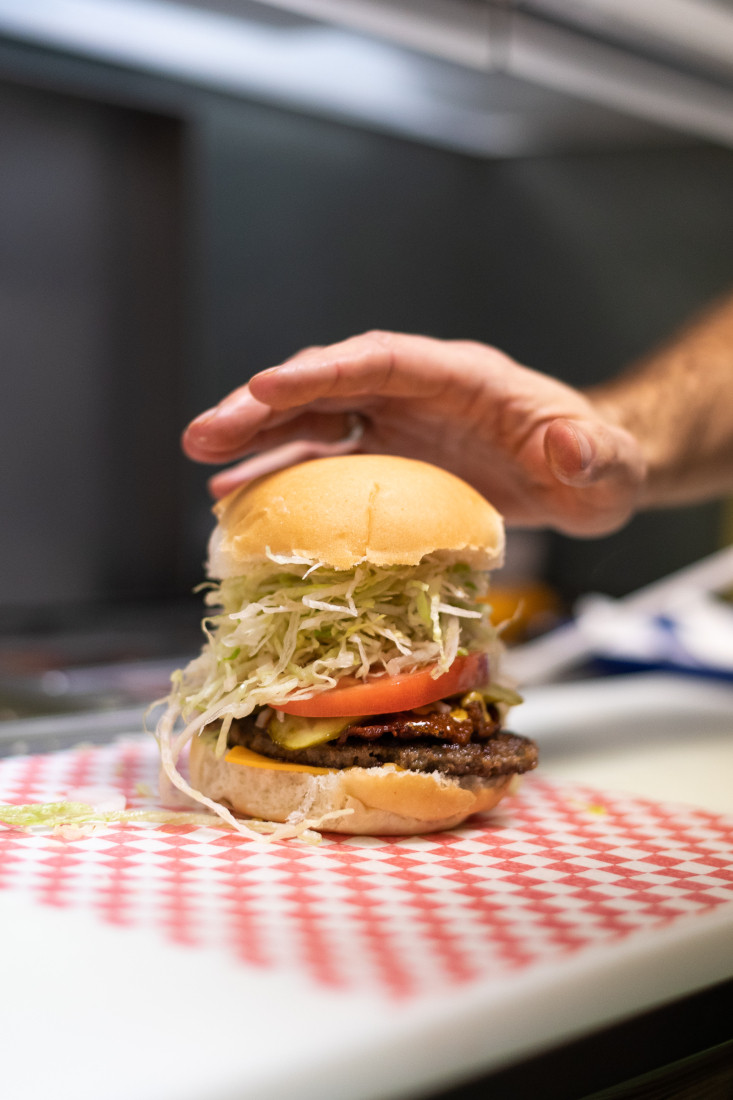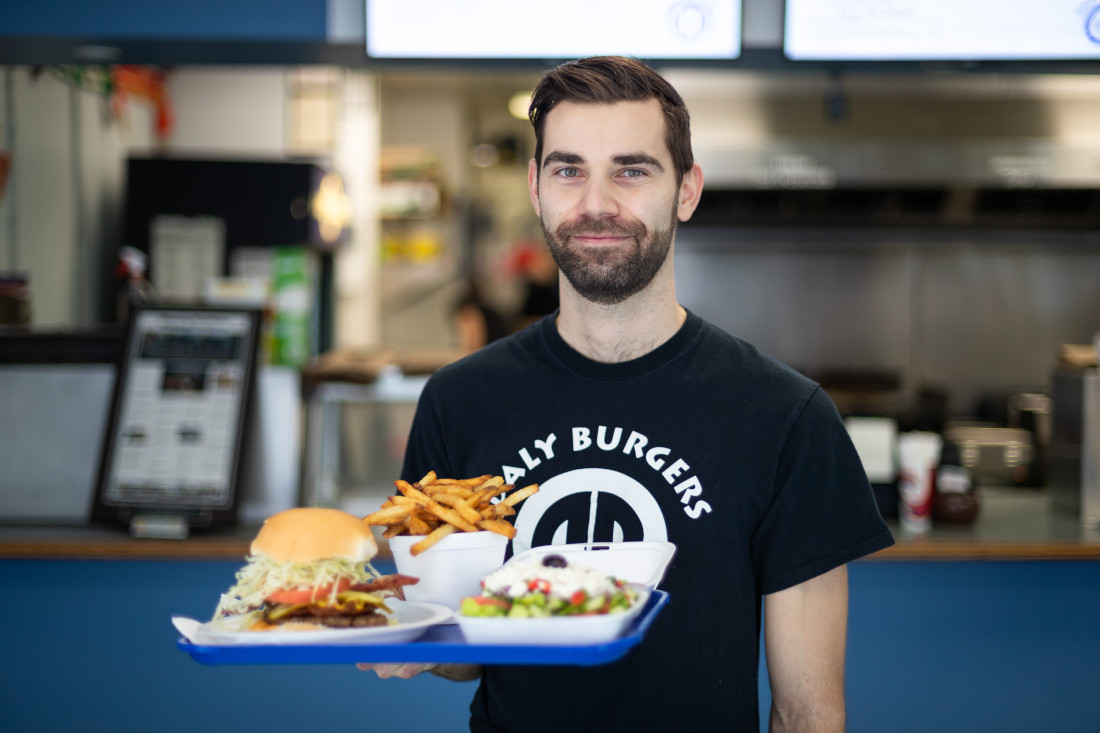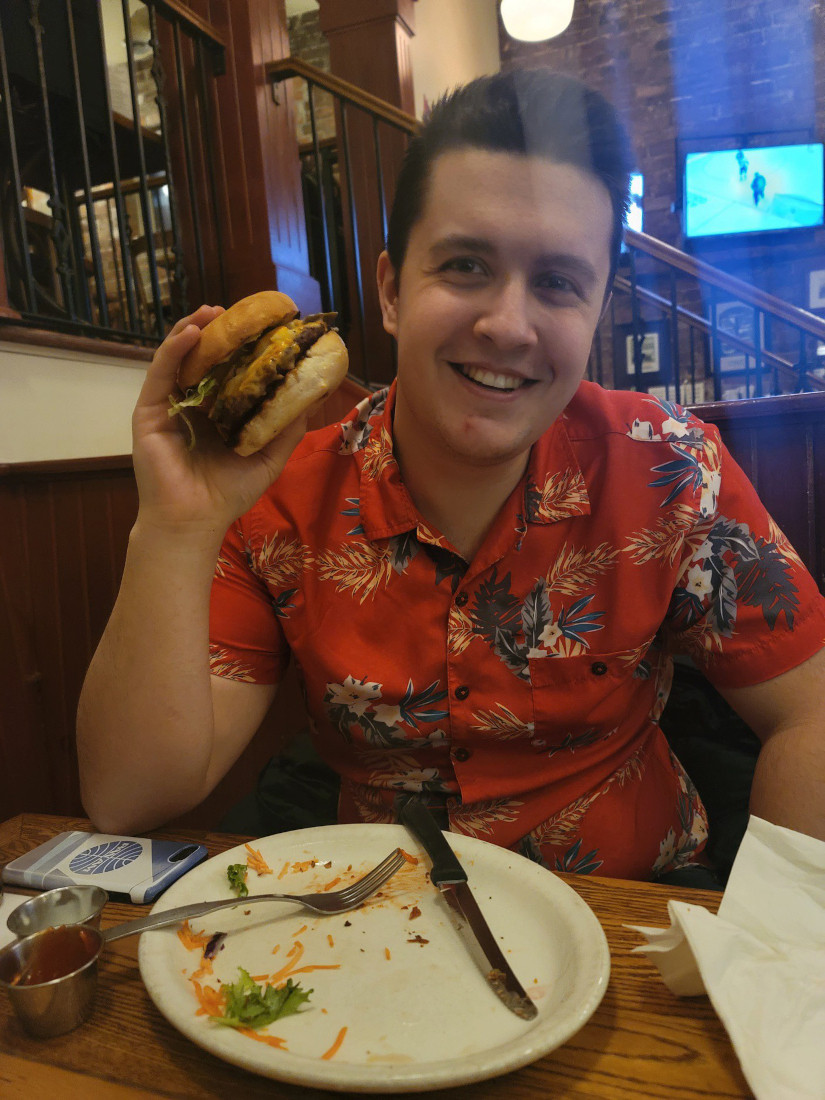Burger time!
Winnipeg’s love affair with the happiest meal
Warning: this article contains mouthwatering descriptions and images of some of Winnipeg’s finest burgers. Enjoy!
Food culture in Winnipeg has many facets. One of the hallmarks of a city made up of many diasporic communities is the variety of restaurants that pop up around those communities. However, even with pizza and perogies, pho and curries, there’s one menu item that Winnipeggers can’t seem to get enough of.
This city loves hamburgers.
The Fat Boy
No discussion of Winnipeg burger history would be complete without mentioning the Fat Boy. And no discussion of the Fat Boy would be complete without mentioning the importance of post-World War II Greek immigrants.
A thorough CBC article by Cory Funk, published in 2019, traces the history of the Fat Boy. For the uninitiated, this term refers to a hamburger covered in chili meat sauce that was invented in Winnipeg.
Three brothers – Gus, George and John Scouras – likely invented the Fat Boy. The trio of Greek immigrants founded many restaurants still active today, including Junior’s and RedTop Drive In. They also founded the Winnipeg Big Boy location, which served hamburgers covered in chili.
The Scouras family, however, did not name the Fat Boy. Mike Lambos, another Greek immigrant, bought Dairi-Wip in 1959 after working at Big Boy. He was the first to give the Fat Boy its name.
The Fat Boy is still an integral part of the Winnipeg burger scene, being served at Greek diner-style burger joints across the city.
Daly Burgers on Corydon Avenue is the latest restaurant venture for the Valias family.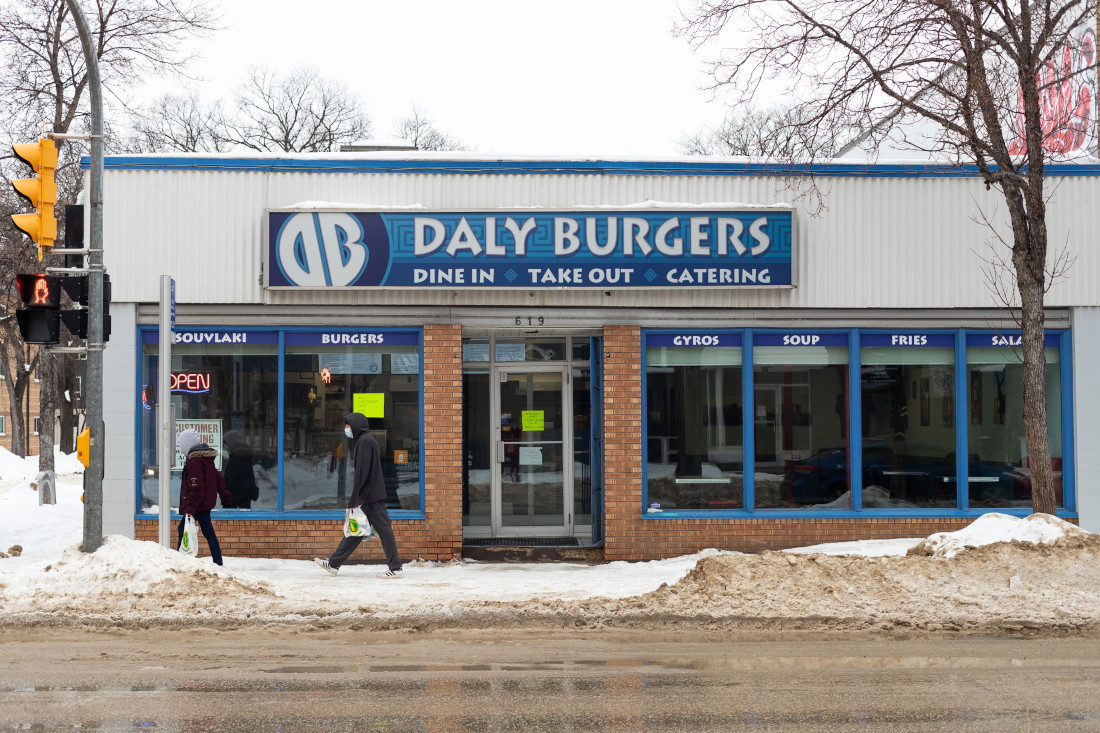
“That’s a staple, and that is our flagship ... and our number-one item,” he says.
“My dad ... had his start in 1986 or ’87 and had a Junior’s restaurant on Henderson Highway, which eventually became Great Burgers and Fries,” Vailas explains. He and his father have been involved with various Winnipeg restaurants, and Daly Burgers is the most recent.
Vailas says working with his family is a special experience, and he “wouldn’t trade it for anything.”
Mrs. Mike’s, located in St. Boniface, has been owned by Greek immigrant Steve Mikos since 1969.
“As a young man, I tried to figure out which way to go,” he says. “My brother was working for the previous owners, and there was an opportunity to buy the place. He asked me to join him, and I did. No regrets.”
Winnipegger and self-proclaimed burger lover Maxim François says he loves Mrs. Mike’s classic look, which evokes mid-century hamburger stands.
“The sign tells you everything you need to know,” he says in an email to The Uniter.
“This place serves hamburgers, fries and hotdogs, and they do it well,” François adds. Mrs. Mike’s, of course, serves a version of the Fat Boy.
When asked about why Mrs. Mike’s remains so popular after 50 years and attracts everyone from the “bottom to the top” (referring to the plethora of celebrities, politicians and athletes who have stopped by – though Mikos proudly does not remember their names), Mikos’ answer is simple.
“Quality and hard work and respect for the customer,” he says.
Beyond burgers
In addition to the well-established burger institutions, many more modern restaurants have emerged in recent years, such as Nuburger.
They have everything from a “Blueberry Yum Yum” (blueberry BBQ sauce, goat cheese, balsamic onions) to a “Drunken Aussie” (grilled pineapple, candied bacon, egg, beets).
François says they have “unparalleled variety.”
“I mean, what other joint serves a burger with a name like ‘Obi-Wan Pierogi?’” he says, referring to their Star Wars and Ukrainian-inspired beef burger topped with “Bothwell cheddar, candied bacon, caramelized onions, potato thins and herb sour cream.”
This chain – which changed its name from Unburger to appeal to meat-eaters – has four locations: on Stradbrook, Kenaston, Regent and at The Forks.
Expanding upon the traditional beef patty, many restaurants in Winnipeg have a bison burger on their menu.
Prairie Ink Restaurant & Bakery, located inside the McNally Robinson bookstore on Grant, serves a bison burger with “caramelized onion aioli, fresh tomato, lettuce and shaved red onion” and served with either “crispy bacon and cheddar” or “sautéed mushrooms and Swiss cheese.”
Bryan Baker, executive chef of Prairie Ink, says this is one of their top-selling items and explains why they have opted for bison over beef.
“We (have) chosen bison because it’s something different, not as common but still delicious,” he says in an email to The Uniter, adding that it is leaner and has a slightly different taste than beef.
Bison is a traditional Indigenous food, which may explain its prevalence on menus in Manitoba. First Nations-owned Feast Café Bistro has a bison burger on their menu, which comes with “Bothwell cheddar, wild blueberry BBQ sauce, shredded lettuce, tomato, red onion, dill pickle, mustard and mayo” and is served on a bannock bun. Bannock and wild blueberries are staples of Indigenous cuisine.
Another way restaurants have been moving beyond the traditional burger is by offering meatless patties. Prairie Ink, for example, has a vegan burger on their menu: a “blackbean and butternut squash patty with curry, cumin and lime” topped with “spinach, cucumber, peach chutney and tofu cheese on a grilled hamburger bun.”
While these vegan and vegetarian options are found at many restaurants around Winnipeg, it is much more difficult to find gluten-free burgers. Although many beef patties and basic toppings are naturally gluten-free, wheat buns and cross-contamination in kitchens often prevent individuals with celiac disease from ordering a burger.
This scrumptious little number is the Fried Chicken Burger at Cocoabeans Bakeshop & Café. (Supplied photo)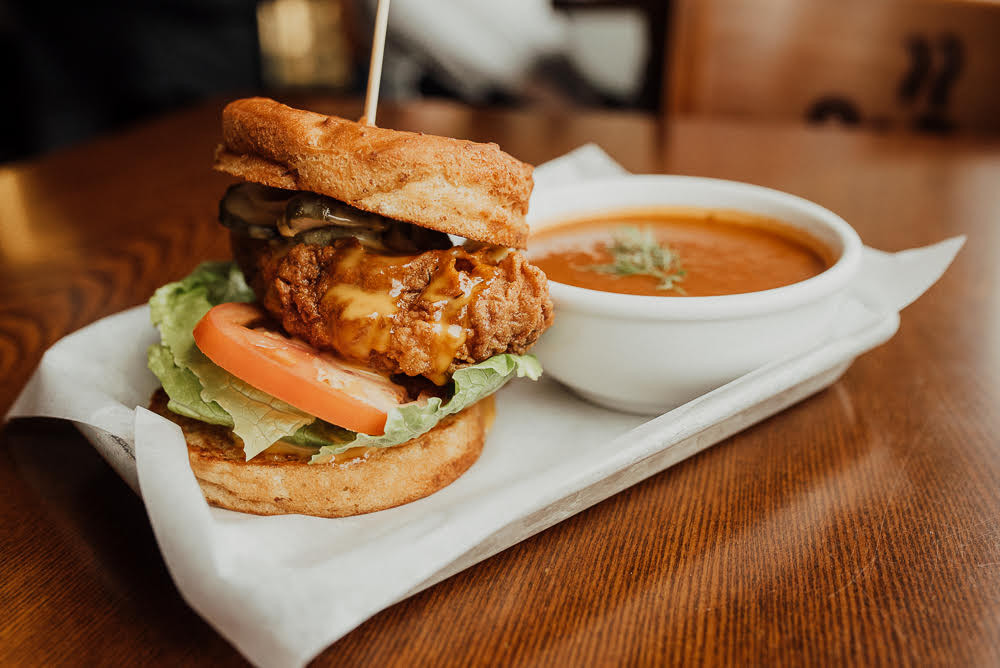
“As a dedicated (gluten-free) bakery and kitchen, it’s extremely rewarding to be able to supply a (gluten-free) burger and bun,” she says in an email to The Uniter, adding that “our customers trust us, and that makes all the effort worthwhile.” Hiebert notes that, aside from her restaurant, it is quite difficult to find a 100 per cent gluten-free burger in Winnipeg.
Cocoabeans currently offers two burgers. “The OG Burger” is served with “spicy mayo, avocado, kale, onion rings and alfalfa sprouts.” The second comes with “stewed mushrooms, Swiss cheese, pickles, bacon and mayo.”
“When your customers express gratitude and love our products, that keeps me focused on creating the best (gluten-free) food we can and using local ingredients when possible,” Hiebert says.
Le Burger Week
The “Olympics” for burgers in Winnipeg is, without a doubt, Le Burger Week. This annual festival takes place across Canada (and, surprisingly, Haiti) and encourages restaurants of all kinds to create and promote a burger. Like a Folklorama for burgers, customers are encouraged to visit as many restaurants as possible, sample the different offerings and vote for their favourites.
In 2021, there were 216 entries in Manitoba, and most were quite creative and unconventional. The winners included items like Carlo’s Cucina “Smokey Barrel,” consisting of a beef patty, apple butter beef brisket, smoked pork belly, dijon mustard, sweet clover honey horseradish aioli, smoked gouda and red pepper jelly.
For restaurants, Le Burger Week can be a big boost for business. Baker says Prairie Ink’s participation in 2020 was especially successful.
“We sold just over 1,000 burgers in six days,” he says.
While last year’s Burger Week was not as successful, Prairie Ink will continue to participate. “It still was good for the business and helped hopefully to bring in some new customers that might not have known about us before,” Baker says.
Prairie Ink Restaurant and Café offer bison burgers with a choice of crispy bacon and cheddar or sautéed mushrooms and Swiss cheese. (Supplied photo)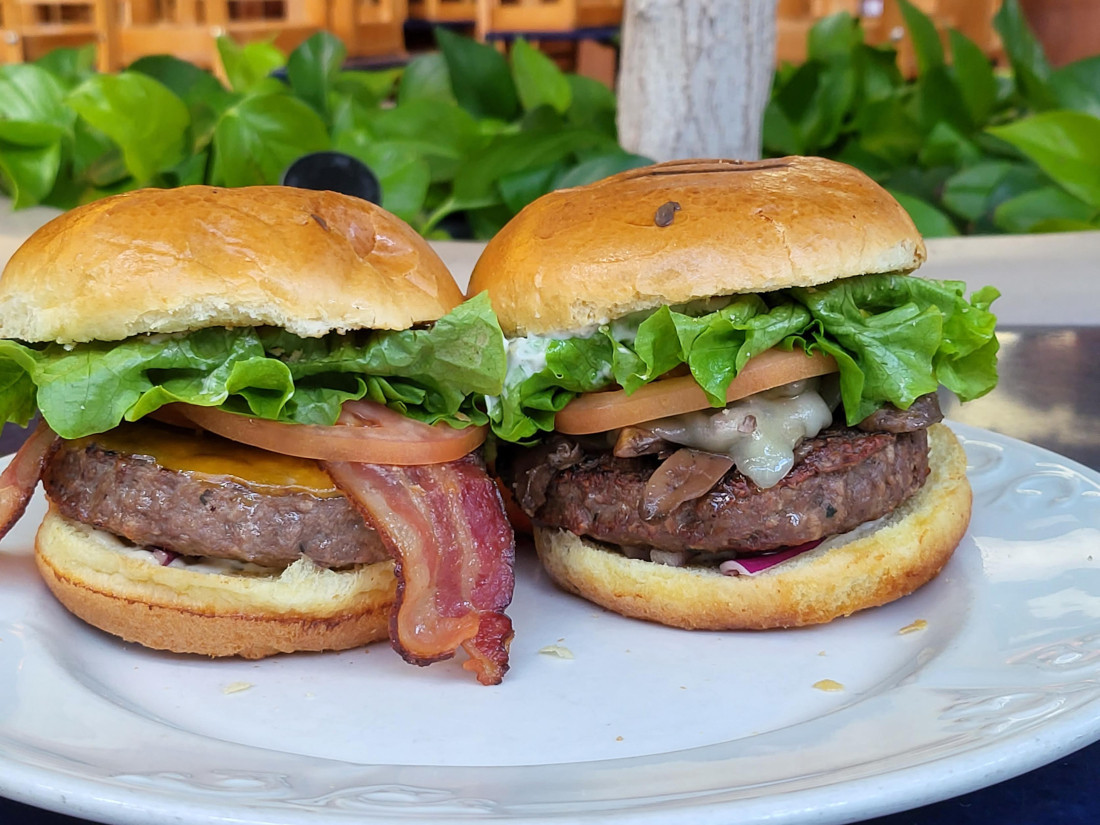
Hiebert says Cocoabeans has only officially participated in Le Burger Week once but has always had a special burger available during that time.
“It’s been really great but doesn’t give us a huge boost in business,” she says, adding that they sell more than usual but not as many orders as some of the bigger restaurants.
For Le Burger Week 2021, Cocoabeans served a “coffee-rubbed beef and goatcheese patty with bacon jam, Swiss cheese, grilled peach and crispy fried dill pickles on a sourdough bun.”
The Cocoabeans veggie burger is made of sweet potato and, like all their menu items, is gluten-free. (Supplied photo)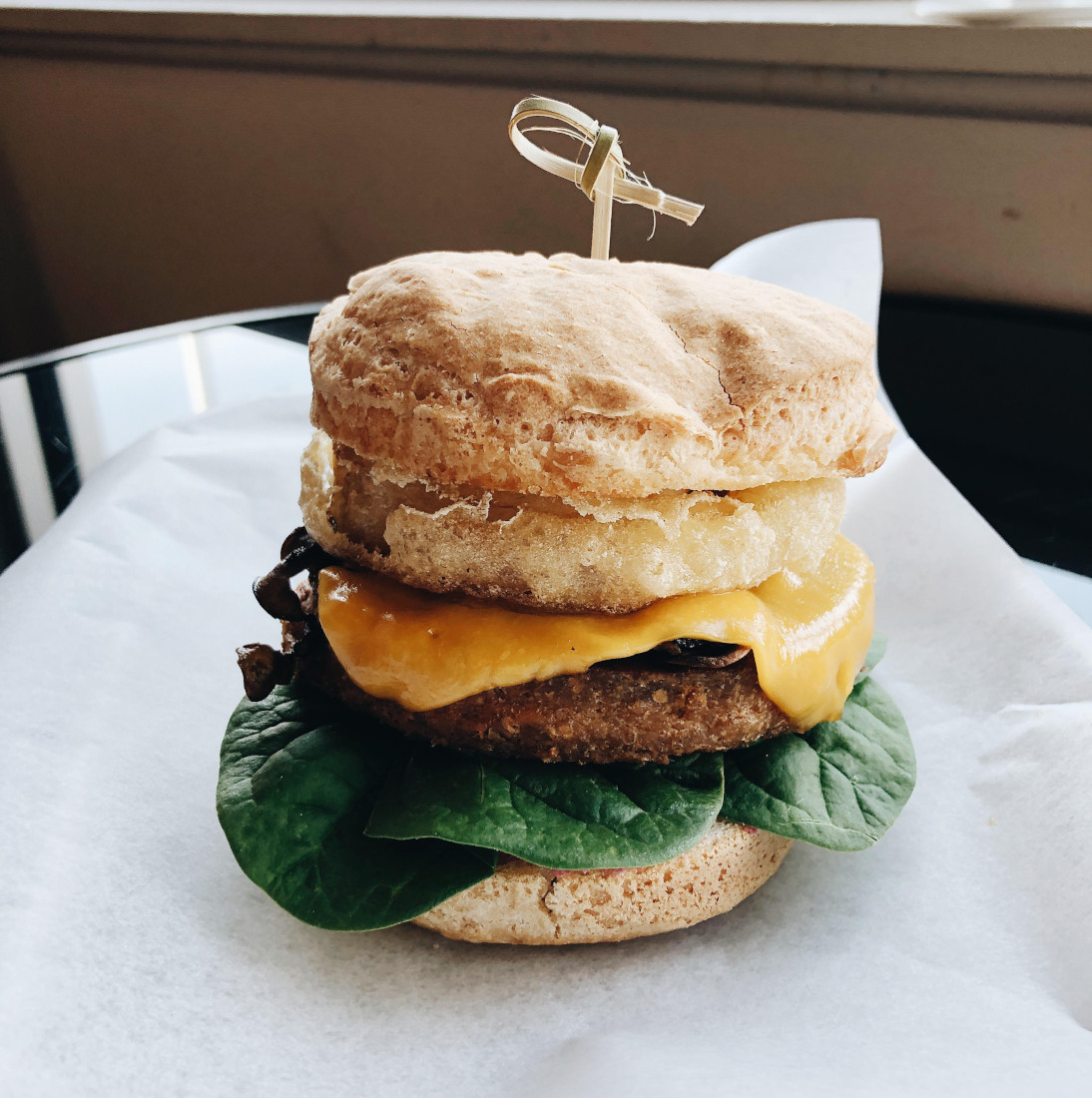
A burger buffet
A quick glance at the Le Burger Week website reveals that most burgers on offer cost somewhere in the $15 to $20 range. Conversely, almost all of Daly Burgers’ or Juniors’ dishes cost under $10.
While this difference in prices differentiates the “classic” Winnipeg burger joints from the new slate of offerings, there certainly does not seem to be any antagonism between the two groups. The fact that places like Mrs. Mike’s have persisted for more than 50 years while many new and unconventional restaurants have emerged in recent years shows that, if anything, their relationship is symbiotic.
Surprisingly – or, perhaps, unsurprisingly – there is so much more to the Winnipeg burger scene that was unable to be included in this article. For instance, Salisbury House and its “Nip” are beloved Winnipeg institutions steeped in history. The Winnipeg burger scene also saw the rise and fall of the vegan Boon Burger, which closed its doors in 2019.
More recently, Monstrosity Burger has made headlines for repeatedly and proudly violating public-health orders, as well as promoting racist theories. This establishment is an exception, as the overwhelming majority of restaurants have dutifully trudged through a pandemic that has not been kind to them.
What has kept them going during the past two years – and during the past 50 years – is passion. Passion for excellence and quality. Passion for creativity and experimentation with new ingredients. Passion for allergen-free food.
Hundreds of thousands of Winnipeggers have surely helped these restaurants survive as well. After all, who doesn’t love a good burger?
Published in Volume 76, Number 17 of The Uniter (February 10, 2022)

